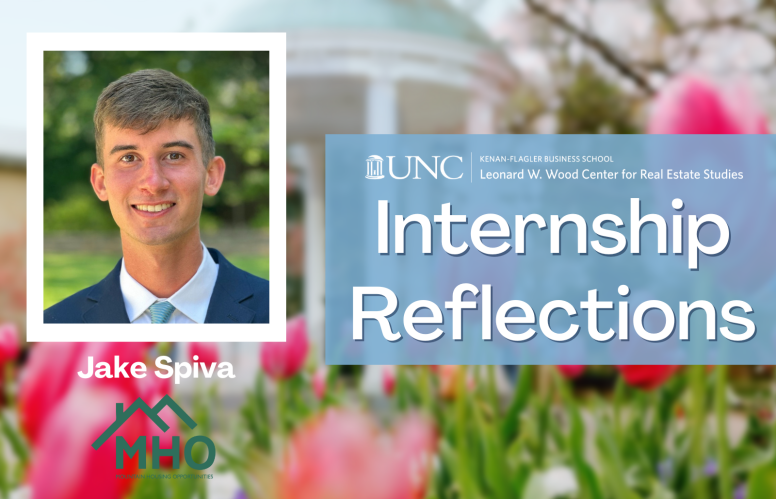Perspectives
Spiva gains real world perspective on impactful development

The Wood Center amplifies the voices of students taking part in real estate-focused summer experiences in a student-produced series called Internship Reflections. Hear first-hand about the amazing professional development, project sites, and real world real estate opportunities these students are being exposed to.
This edition of Internship Reflections highlights the experience of Jake Spiva, one of three undergraduate students awarded the inaugural Affordable Housing Fellowship for summer 2025. This new program offers rising UNC seniors the opportunity to intern with nonprofit housing developers across North Carolina, providing hands-on experience and a deeper understanding of affordable housing and its impact on communities.
By Jake Spiva
This summer I had the opportunity to intern with Mountain Housing Opportunities (MHO), a nonprofit affordable housing developer based in Asheville, North Carolina. MHO’s mission is to build and preserve safe, affordable homes and to strengthen neighborhoods so that everyone, regardless of income, has a place to live. Their work spans new construction, rental communities, and homeownership programs, all aimed at addressing the region’s growing housing needs.
I worked with the Rental Communities team, which focuses on developing affordable apartment buildings for low-income individuals and families, typically ranging from 60 to 160 units each. My role gave me exposure to multiple stages of the development process. I helped evaluate potential sites for new projects that qualified for affordable housing tax credit programs. I built and analyzed financial models, including pro formas and cash flow projections to assess project capital feasibility, and I attended on-site Owner-Architect-Contractor (OAC) meetings where I saw firsthand how project teams collaborate to move developments forward. I also had the chance to sit in on conversations with lenders, other developers, neighbors, and city officials, which gave me a glimpse into how financing and regulatory considerations influence the success of a project.
The internship gave me many opportunities to apply what I have learned in the classroom. In particular, I frequently used Excel to adjust pro formas and analyze cash flow statements. Because of my coursework, these tasks came naturally and allowed me to contribute meaningfully from the beginning. My Real Estate Development class provided me with a clear framework for understanding the life cycle of a project, from site acquisition, to entitlement, to financing, to construction. This foundation allowed me to better and more quickly understand the context of the assignments I was given.
Another highlight of the summer was attending the Western North Carolina Housing Summit, where I met housing providers, nonprofit leaders, and local government officials and agencies who are all committed to expanding affordable housing options in the region. Listening to panels and speaking with professionals from across the industry gave me a broader perspective on the challenges and opportunities within affordable housing. It was eye-opening to see how developers like MHO fit into a larger network of organizations, each playing a role in tackling the housing crisis.
Overall, this summer confirmed my desire to pursue a career in real estate development. I am drawn to the way the field combines financial analysis, problem-solving, and teamwork with the ability to create lasting community impact. Post-graduation, I hope to continue building on these experiences by pursuing a career in development where I can use my skills to contribute to projects that are both financially sustainable and socially impactful. I am very thankful to the Wood Center for providing me this opportunity as well as to all the amazing people at Mountain Housing Opportunities who made the summer so engaging, educational, and rewarding.